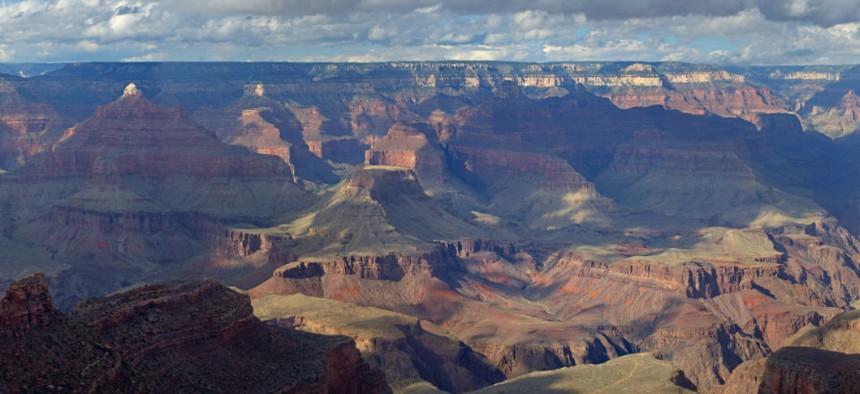
M. Quinn/National Park Service
Grand Canyon Park Gets Creative to Attract Bids on Concessions Contract
Park Service taps cash from other parks to pay down debt to the current contractor and make the new agreement more attractive.
For nearly 100 years, Grand Canyon National Park has enjoyed a beneficial relationship with Xanterra Parks and Resorts, the nation’s largest parks tourism contractor whose corporate ancestors have sold lodging and concessions at the Arizona wonder since the late 19th century.
But in the 21st century, the cash-strapped National Park Service finds itself pressured to get creative in complying with a 1998 federal law requiring it to regularly solicit competitive bids for services.
The problem: Xanterra over the decades has invested up to $200 million in improvements to its hotel, gift shops and restaurants around the canyon’s South Rim, money it would be entitled to collect should the government yank its concession contracts. The chances of finding a competing concessions contractor willing to assume that debt to Xanterra are considered slim.
So in August, the Park Service announced a new approach. It would solicit a major concessions contract—worth more than $1 billion in potential revenue over 15 years—for the third time since 2013, the first private bids that came in having been deemed inadequate.
But this time, in a decision straight from National Park Service Director Jonathan Jarvis, the winning contractor would have to reimburse Xanterra only a more manageable $57 million. That’s because the Park Service plans to tap $100 million in fee revenues accumulated by other parks in the national system to pay down the debt to Xanterra. And, it will raise the franchise fees the new contractor is entitled to collect from a recent 3.8 percent to 14 percent.
“Competition drives services, drives quality, drives a lot of things in terms of what the visitor will experience," Grand Canyon Superintendent Dave Uberuaga told the parks advocacy blog National Parks Traveler. "So it enhances ... whatever the concession is to carry out. In general, the competitive nature creates better services and a higher return to the government.”
The move, while unusual in its scope, is fully authorized under Public Law 111-88, Government Executive learned from Maureen Oltrogge, public affairs officer at Grand Canyon National Park. The statute says “franchise fees credited to a sub-account shall be available for expenditure by the secretary, without further appropriation, for use at any unit within the National Park System to extinguish or reduce liability” for a contractor’s past investment in public property, known as “possessory interest or leasehold surrender interest.”
The funds borrowed from other parks’ accounts will be repaid before the expiration of the new contract, which will kick in as of February 2015, Oltrogge added.
Called upon to improvise, Grand Canyon Park reduced some of the debt by moving some of Xanterra’s work in grocery, food service and general retail stores to a separate contract signed in August with another firm, Delaware North Companies Parks and Resorts. In addition, Superintendent Uberuaga came up with $25 million from Grand Canyon’s Park’s other accounts (entrance fees are $25 per car) so that he had to borrow only $75 million from other parks, according to Oltrogge. “We’ll eventually have to pay back the $75 million; it’s not a gift,” she said.
Bids on the second, larger, contract are due on Oct. 8.
Not everyone is happy with the deal. Xanterra CEO Andy Todd said in an internal memo to employees that was leaked to multiple reporters that the company did not seek the accelerated payback of its stake in the federal property, nor was he consulted. (His memo was part of a lengthy email complaint by an individual under the name Natasha Miller. That person did not respond to Government Executive requests for an interview, nor could officials identify anyone by that name working in the park system. Xanterra’s Todd did not respond to inquiries.)
On Sept. 17, The Washington Times raised an eyebrow in an editorial. The deal is “certainly a better bargain for the companies, but not so great for the taxpayers,” it said. “The government invited trouble. In 1998, a new parks management law required concession contracts be put out to bid every 10 years. That took away the incentive for companies to invest for the long haul. A management company isn’t likely to invest if it knows it might not be around to get the return on its investment. Congress could learn from this and take a fresh look at how these deals are struck.”
To David Nimkin, southwest region director for the nonprofit National Parks Conservation Association, the Grand Canyon money shuffle is painful in the short term but positive in the long term. “The lease holders surrender interest in such a large number because the contractor Xanterra has monopolized this process. But that doesn’t mean Xanterra did a poor job,” he told Government Executive, “just that it is the responsibility of the Park Service to put it out for competitive bids.”
The franchise fees set by the Park Service, Nimkin added, “become an important revenue source, and it has to be reflective of the return the contractor expects from its investment. But the Park Service needs a reasonable return itself.” The debt to the existing contractor “is a problem that needs to be addressed—it’s not sustainable,” he said. “I give credit to the Park Service and Dave Uberuaga for confronting a problem that’s gotten out of hand.”
Grand Canyon Park spokeswoman Oltrogge said the deal makes the October contract solicitation “a much better business decision since we’re no longer accumulating large debt. It will move us forward in a positive manner, and will benefit visitors to the park.”
NEXT STORY: Who You Marry Affects Your Success at Work







